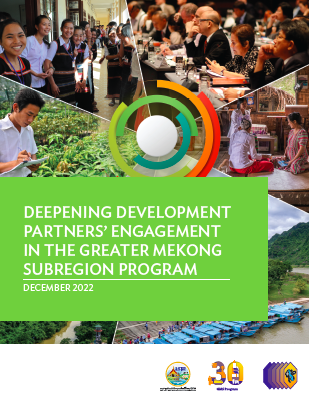Development Partners
Development partners play a key role in implementing the GMS Program’s initiatives. From the launch of the program in 1992, ADB, GMS governments and multilateral and bilateral development partners have jointly co-financed over $28 billion for over 100 investment projects supporting regional cooperation and integration in the GMS. Of this amount, development partners, not including ADB, contributed about one third, or $9.1 billion.
Deepening Development Partners’ Engagement in the Greater Mekong Subregion
Development partners’ support covers financing of investment projects through loans and grants, as well as through technical assistance and sharing of knowledge and expertise. The Greater Mekong Subregion Economic Cooperation Program Strategic Framework 2030 (GMS-2030) has called for the program to undertake work in new, innovative areas and to further emphasize themes that cut across its activities, such as migration, digitalization, gender, and trade and investment. Development partners can help the GMS Program in these emerging areas with their knowledge, expertise, and experience. At the same time, the financing needs in the GMS Program remain large and are likely to grow as the program expands to incorporate new areas and investments to promote green infrastructure for greater climate resilience.
Currently, development partners’ engagement in the GMS Program is largely through the Annual Development Partners Meeting—often held back-to-back with the GMS Ministerial Conference, where the partners are also invited to make brief statements on their support and areas for alignment of cooperation. While this venue allows them to reiterate their support and outline their program in the subregion, the ambitious scope of the new GMS-2030 entails going beyond the existing processes and identify actions and mechanisms for deeper collaboration.
7 Things to Know about the Development Partners’ Engagement in the GMS Program
Past Development Partners’ Meetings
| Date | Venue/Country |
|---|---|
| 8 December 2022 | Luang Prabang, Lao PDR |
| 9 December 2021 | Videoconference (Lao PDR, host) |
| 20 October 2020 | Videoconference (PRC, host) |
| 17 November 2019 | Phnom Penh, Cambodia |
| 18 September 2017 | Ha Noi, Viet Nam |


